This biography was written for the 2013 What a Character! Blogathon hosted by Once Upon A Screen, Outspoken & Freckled and Paula’s Cinema Club.
Introduction
I knew I would get carried away writing about Hugh Herbert, but he turned out to have a more complicated biography than I had ever expected. It quickly became apparent that Herbert is one of those neglected stars whose biography has become muddled with inaccuracies over time, though his complete story wasn’t always clear way back then either!
Three key aspects to Hugh Herbert’s life and career have especially become confused over the years and they become the areas most concentrated upon below. 1) His date of birth is the most minor of these inaccuracies. I see two possible dates and settle upon one. Google and Wikipedia have it wrong; Surprisingly the IMDb has it right, or at least agrees with me. 2) His marriage. It was to one woman and it lasted from 1917-1949. His wife acted for awhile and her stage name often takes on a life of its own, becoming a second wife. 3) Most key, I think, is the confusion between Hugh ‘Woo Woo’ Herbert, the actor, and F. Hugh Herbert, the screenwriter. Hugh the actor also did quite a bit of writing during the earliest part of his Hollywood career which coincided with the birth of the talking picture. While key feature films are correctly attributed to him, several shorts—including many which were adaptations of his own vaudeville skits—and a handful of RKO features are incorrectly handed to F. Hugh, who was very busy himself during this same period. On to the details …
 “The best business in the world is to make people laugh. Plenty of laughter means good health. Then people are usually happy when they are laughing, and what is better than to make people happy?” –Hugh Herbert, 1916.
“The best business in the world is to make people laugh. Plenty of laughter means good health. Then people are usually happy when they are laughing, and what is better than to make people happy?” –Hugh Herbert, 1916.
“People seem to enjoy me on the screen because I always act the part of a dullard, a very stupid fellow … and that makes them feel superior. And who doesn’t like feeling superior!” –Hugh Herbert, 1936.
Hugh Herbert still makes people laugh throughout dozens of lighthearted films of the 1930s and ‘40s. A small fellow, but impossible to ignore with a face variously described as resembling a hot water bottle or a cucumber. His eyes go wide, his hands come together and his fingers flutter, perhaps he cries out his trademark, “Woo woo!” Dullard is kind, while “a very stupid fellow” better hits the mark on most of Herbert’s better remembered portrayals. Who could imagine that this comic actor, perhaps most widely renowned for his having inspired the favored two syllable exclamations of both Looney Tunes’ Daffy Duck and Curly Howard of The Three Stooges, had by that time long held writing credits for over 150 vaudeville skits, numerous film shorts, as well as co-credit for dialogue on the first ever all talking feature-length film, Lights of New York (1928).
Before you protest, it’s time for an important and, with apologies, lengthy aside. The Woo Woo! screen comedy fixture who was born Hugh Francis Herbert is not the same man as F. Hugh Herbert, whose name is found on many more additional scripts from this same period and well beyond. But Hugh “Woo Woo!” Herbert does indeed hold a few such credits himself, which makes for a lot of confusion.
Hugh Herbert vs. F. Hugh Herbert
That confusion is understandable. While Hugh, our actor, was born in Binghamton, New York nearly thirteen years before F.Hugh, the writer, was born in Vienna, Austria, both men reached Hollywood at approximately the same time.F. Hugh Herbert arrived first, in 1926 with Metro-Goldwyn-Mayer, where he wrote scripts for Greta Garbo and Lew Cody films. F. Hugh signed a long term deal with MGM in February 1927 and remained with that company until August 1928 when he signed on with Paramount. Meanwhile, Hugh, the future Woo Woo! man, was himself already a long established and well-known vaudeville performer when he accepted a round-trip ticket,a $500 cash bonus and a good regular salary to bring his act West to the Hollywood Music Box. In December 1927 Oakland Tribune journalist Wood Soanes reported that Warner Brothers had signed our Hugh Herbert as a writer and in the same breath (this becomes important) resigned Bryan Foy and Murray Roth with the additional note that more full length movies with Vitaphone are being planned.
Bryan Foy, eldest son of Eddie Foy and formerly one of the Seven Little Foys, had been associated with Murray Roth since at least 1922 when a Variety piece placed the men together at Fox writing comedy. They are linked with Hugh Herbert throughout much of 1928, well before Hugh established himself as an on-screen talent. At that time he received his studio pay checks primarily for his writing. The trio are best remembered as a team on Lights of New York, which became the first feature-length sound film when it premiered July 6, 1928 at the Strand in New York. Herbert and Roth wrote it and Foy directed. Lights of New York had been planned as a two-reeler, but Foy claimed he overshot it and the finished film wound up running just under an hour.
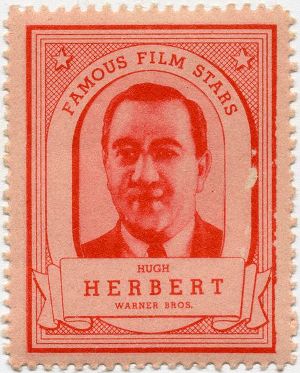 While a writing credit on Lights of New York almost reads as an error on Hugh Herbert’s list of film work, the actual mistake comes in crediting much of his work during this time to the younger F. Hugh Herbert, then of MGM and Paramount.
While a writing credit on Lights of New York almost reads as an error on Hugh Herbert’s list of film work, the actual mistake comes in crediting much of his work during this time to the younger F. Hugh Herbert, then of MGM and Paramount.
The same Lights of New York team of Herbert and Roth with Foy directing was responsible for several early Vitaphone shorts, including a couple that can be viewed on one of the DVD collections recently released by Warner Archive.
Our Hugh Herbert, the one best remembered for his later screen antics, wrote, co-wrote and/or directed dialogue on the following 1928 single reel shorts: Sunny California, Retribution with Henry B. Walthall, Miss Information, The Lion and the Mouse, Tenderloin, Glorious Betsy, The Night Court with William Demarest, who became one of Hugh’s best friends in Hollywood, and a pair of titles that also co-starred Hugh’s wife, Rose Epstein under her stage name of Anita Pam, Hollywood Bound and Lucky in Love.
Some of these were said to be based upon Hugh’s old vaudeville skits. There may have been others and there’s a good possibility that Mrs. Herbert, Anita Pam, who I’ll have more on in a bit, appeared in more than those two titles named.

Anita Pam is the first woman from the left (the shortest one) shown in this August 19, 1927 clipping from the Oakland Tribune.
The most outstanding of Hugh Herbert’s incorrectly attributed credits is an 18-minute short filmed for Fox titled Mind Your Business. Not only does the IMDb give the writing credit to F. Hugh Herbert, claiming he was billed simply as Hugh Herbert, it also lists this film as F. Hugh’s only acting appearance. But it was the elder Herbert who wrote and originated Mind Your Business as one of his most popular vaudeville skits earlier in the 1920s.
A major clue to distinguishing the two Hugh Herberts is an obvious one: The F. preceding Vienna-born F. Hugh Herbert’s name. His name appeared on screen as F. Hugh Herbert from the time of his Hollywood arrival in 1926 and there appears to be no reason why he, or whatever company was making out his paychecks, would ever drop this extra initial from his credits.
Mind Your Business came after Hugh’s move from Warner Brothers to the Fox Movietone staff in June 1928. While Hugh was with Fox, F. Hugh was transitioning from MGM to Paramount, where he remained for about a year beginning in August 1928. Towards the end of F. Hugh’s Paramount tenure, our Hugh was busy on another one of his more acclaimed and correctly credited writing jobs: Dialogue for The Great Gabbo.
On October 11, 1929 Ralph Wilk of Film Daily reported that Hugh Herbert, who “has been at Warners and Fox and also wrote dialogue for The Great Gabbo,” had been signed by RKO to write dialogue and act as dialogue supervisor. Just to keep our Hugh’s straight, F. Hugh was let go by Paramount in August 1929 due to a policy Paramount was actively enforcing in attempts to cut their writing corps in half. He landed work at Columbia through the end of the year and by April 1930 was listed as a contract writer with First National. Our Hugh was with RKO during all of this time, where he was soon dubbed a triple-threat for writing, directing (dialogue) and acting.We will now let F. Hugh Herbert disappear from our story, though with a final remark noting that he is also awarded credit for some of Hugh’s RKO work that follows.
Writer to Actor at RKO
RKO head of production William Le Baron hired Hugh in response to his work on The Great Gabbo and Herbert gained a long term deal with the company after both scripting and directing the Lowell Sherman vehicle He Knew Women (1930). Herbert was then assigned as dialogue director on the popular railroad movie Danger Lights starring Louis Wolheim and Robert Armstrong. Hugh’s suggestion that more comedy be written into the film was not only accepted, but associate producer Myles Connolly also decided that Hugh should play the hobo role that he created in the process.
It was off his success in Danger Lights that Hugh Herbert’s primary job description really began to shift from writer to actor. He likely does both in 1931’s The Sin Ship, a title he most definitely appears in alongside Danger Lights star Louis Wolheim, who also directed, but whose script is typically credited to our old friend F. Hugh. I’m going to follow my rule above though and award this writing credit to the name as billed: Hugh Herbert. After all, he’s been under contract to RKO for awhile now, there’s little reason for them to confuse the two men.
The Public Record
Hugh Francis Herbert was born in Binghamton, New York, August 10, 1884 (The California Death Index and Herbert’s own gravestone give the date as 1885, but Hugh’s World War I and World War II draft registration cards give the date in his own hand as 1884. The IMDb is way off as of this writing with 1887). Hugh was the middle child of John Herbert and the former Mary Gallagher who had both come over to the States from Scotland sometime before their three children were born.
Eldest son James was two years Hugh’s senior and the youngest brother, Thomas, came three years after Hugh. Tom became an actor himself and actually appeared alongside Hugh in a few films including the underrated Traveling Husbands (1931), which saw Tom billed as Tom Francis. On being the middle child, Hugh told Katherine Hartley of Photoplay, “They considered drowning me, but Pop said, ‘Ah, we might as well keep it. It might be good for laughing purposes.’” In the same 1936 interview, he added: “So you see, I just sort of slipped in between. Nobody ever paid any attention to me. That’s why I guess, as I grew older, I thought I’d like to be an actor.”
The family reported from Brooklyn on the 1905 census. As a teenager (Hugh says he was 13, but given the muddling of his actual date of birth I can’t confirm that age), older brother Jim was an usher at Proctor’s Theater in Manhattan, while younger brother Tom kept busy selling newspapers. Hugh wasn’t doing anything, which led to a family blowup that culminated with Hugh leaving home. Jim helped land him an usher’s job and Hugh was soon getting his feet wet in some very small amateur productions (Hugh claimed his first stage credit came in a bit role in Roaring Dick and Company starring Maurice Barrymore, father of Ethel, Lionel and John. Given the IBDb’s production date of 1896, I’d need better confirmation than memory). Then came his often repeated story of becoming a “talker” for the silent screen.
Hugh was paid $15 a week to stand behind a silent movie screen for 18-20 shows per day and give voice to the silent characters for the audience.
It was while working as a “talker” that Hugh was discovered by Gordon & North who starred him in the playlet The Son of Solomon, the first of many Jewish roles Herbert played on vaudeville. “I have found it almost impossible to prove to people that I am not Hebrew,” Hugh said in 1917 and, touching upon the subject again years later in 1936, “It’s a good religion and were I born a Jew I certainly wouldn’t deny being one.” Herbert, described by the New York Clipper in 1919 as, “easily the best Jew character man in vaudeville,” always described himself as Scotch-Irish and was eventually married by a Priest–to a Jewish girl, Rose Epstein, in 1917.
Rose Epstein and Anita Pam, One and the Same
Rose, described as a non-professional by Variety in their 1917 wedding notice, was born in Kentucky and raised in Fort Worth, Texas. Rose was said to be visiting her cousin backstage in New York the year before when she came upon Hugh trying to overcome the effects of a bad head cold so he could perform his part in The Prediction that night. Seeing the actor dangling his head over a pan of boiling water, Rose told him, “You’re not doing that right,” and set him up with a cloth over his head to give the steam better effect. A grateful Hugh took her out to dinner after the show.
Variety appears to have jumped the gun when it reported that Hugh and Rose were married in Cincinnati on December 31, 1916, but a later report matched their marriage certificate in saying the two were hitched in Detroit, July 14, 1917. Rose was 23-years-old, nine years younger than Hugh.While Variety called Rose a non-professional in that 1917 report, it had mentioned that she had a finished musical education in the piece from a few months earlier. One of the several reports that described the couple’s first backstage meeting said she had never been on the stage herself, but came from a theatrical family. I suppose that in 1916 she may have been a young non-professional visiting her cousin as the one article explained. In any case, Rose Epstein Herbert was soon one half of a theatrical family working in her husband’s company under the name of Anita Pam.
First mention of Miss “Pam” in Herbert’s company was spotted in 1919 and she appears with him routinely throughout the 1920s in pieces such as Mind Your Business, in which she played a stenographer, Home Comforts, described as a domestic farce, and as leading player in The Cat, a piece Hugh that wrote especially for Rose and in which she toured in her own troupe separate from her husband throughout 1921-22. As mentioned earlier Rose would also appear as Anita Pam in a few of Hugh’s earliest Vitaphone shorts.
Vaudeville brought the Herberts to Hollywood where Anita Pam was soon laid to rest, only to be brought back to life for occasional radio appearances alongside husband Hugh and to accompany him on a U.S.O. tour in 1942.
The Hugh Herbert We Remember
As Hugh Herbert became a screen personality during the early 1930s it’s interesting to note the versatility shown during his earliest roles at RKO.
He’s a toned-down version of his later self alongside Edna May Oliver in Laugh and Get Rich (1931) and delivers a combination of the madcap along with more reflective moments in Traveling Husbands (1931), where Hugh’s Hymie Schwartz probably also offers a hint of his earlier vaudeville work.
I suspect Hugh already knew the popular comedy pair Wheeler and Woolsey from vaudeville when he appeared in 1930’s Hook, Line and Sinker and he credits 1933’s wild Diplomaniacs, starring the same pair at their zaniest, as being where his famed cry of Woo Woo! originated. If so it must have been done off-screen or been trimmed from current prints because he never utters the exclamation in the current Warner Archive release of the film. In any case Hugh’s Chinese assistant to Louis Calhern’s dastardly villain was, while far from politically correct, without doubt his most hilarious screen portrayal to date.
Hugh’s contract with RKO expired after Diplomaniacs, but based upon his freelance performance in First National’s She Had to Say Yes (1933), a pre-Code stunner starring Loretta Young that features a somewhat atypical (sleazy) Hugh, he made another well-positioned fan in Warner Brothers head of production Darryl F. Zanuck. Warner Brothers signed Hugh to a five-year contract and it was his next role, in that same year’s Goodbye Again, that Photoplay’s Sara Hamilton later remembered as being responsible for Hugh winning over audiences and really establishing himself as a popular supporting player.
From here the Hugh Herbert character developed. The fluttery fingers and trademark giggle, present since his RKO films and probably dating back to the stage, became exaggerated, as did the Woo Woo, whether it originated during Diplomaniacs or not. I noticed an uptick in descriptions of Hugh as being “daffy” throughout 1937-38, around the same time the famed duck made his Looney Tunes debut.
Herbert continued in supporting roles at Warner Brothers until February 1938 when the company elevated him to star status. To give an idea of the distinction of this promotion, it was reported at this time that Warner Brothers had 27 star players, including Hugh, and 77 featured players under contract. Unfortunately, the first starring role for Hugh Herbert was in Sh! The Octopus (1937), an enjoyable mystery film but about as far from a blockbuster as you could get. Hugh might have been a “star” at Warners, but no one was confusing his status with that of Errol Flynn or Bette Davis!
Off-screen Hugh kept busy with a trio of roles around Studio City, where he lived. He was Mayor, President of the Chamber of Commerce, and Chief Columnist of the Studio City News, from which his articles were bylined, “The Mayor, Hugh Herbert, Says.”
Hugh remained very active on-screen throughout the next decade as well, first signing a five year starring contract with Universal in 1940 before moving to Columbia in 1944. While continuing to appear in features, Hugh returned to his screen roots at Columbia where he starred in a number of comedy shorts. Hugh Herbert continued working right up until the time of his death, appearing in movies and even managing a few early television appearances, but unfortunately most of the Hugh Herbert news during the latter part of his life centered around his mostly amicable divorce from Rose in 1949 after 31 years of marriage.
Divorce and Death
“When she went to Texas, I thought she was just taking a trip,” Hugh said of Rose’s late 1947 Hollywood departure. “Rose spent her girlhood in Texas. She had lots of friends down there. I didn’t worry for weeks. I didn’t know the truth until I got a letter from a attorney saying that my wife wanted a property settlement.”Rose told Vivian Cosby that Hollywood had changed Hugh and, while never mentioning her own career, times had been better for them back in New York in earlier days. “I kept house while Hugh worked on new routines. I’d listen to him go over and over them, while we both dreamed of the day he would land a part on Broadway.” Hugh mentioned Rose’s constant card-playing to another reporter, Harrison Carroll, though it should be noted that the 1949 Associated Press report announcing their divorce mentions Hugh having lost $63,000 gambling in Las Vegas.
Rose said Hugh had changed. Cosby wrote, “The light-hearted, carefree and amusing man she had married was often preoccupied and melancholy. He often drove for hours alone at night, after leaving dinner parties without even a good-night to his friends.”
Hugh told Harrison, “I lost my temper occasionally. For 25 years, I had a habit of bringing breakfast to Rose in bed. One morning she said: ‘Does it ever occur to you that I might like tea for breakfast instead of coffee?’” Herbert flipped. “’Tea!’ I cried. ‘Tea!’ I hurled the tray to the floor and I never brought her breakfast again.’”Rose’s lawyer told her she could get more out of Hugh if she returned to California to file for her divorce. She remained in Texas and was quite satisfied with being awarded $10,000 cash to buy a house and $300 a week thereafter for support.
Hugh continued working. One night, after complaining that he felt ill, Hugh called his doctor and personal friend, Dr. Victor Kovner, to his house. Kovner arrived but could not save Hugh Herbert from the heart attack that claimed his life that night, March 12, 1952. The writer, performer and movie star was 67 years old. He willed most of his $200,000 estate to the motion picture relief fund.
Rose Epstein Herbert aka Anita Pam died in 1973. They had no children.
This biography was written for the 2013 What a Character! Blogathon hosted by Once Upon A Screen, Outspoken & Freckled and Paula’s Cinema Club.
Sources
- Carroll, Harrison. “The Woo-Woo Man Loses His Temper.” American Weekly 16 Jan 1949: 5. Web. Old Fulton NY Post Cards. 10 Nov 2013.
- Cosby, Vivian. ”Money Spoils a Dream.” American Weekly 2 Oct 1949: 9. Web. Google News. 7 Nov 2013.
- ”Find A ‘Find.’” Variety 7 Jan 1911: 3. Web. Media History Digital Archive. 7 Nov 2013.
- Hamilton, Sara. “Woo, Woo—and I Do Mean Woo.” Photoplay Aug 1938: 63. Web. Media History Digital Archive. 9 Nov 2013.
- Harrison, Paul. “Hugh Herbert Can’t Discard Funny Face, So, Poor Fellow, He Must Remain a Comic.” Sandusky Star Journal 16 Jul 1936: 2. Web. Newspaper Archive. 8 Nov 2013.
- Hartley, Katherine. “Hugh Herbert Isn’t All He Wise-Cracks To Be.” Photoplay Nov 1936: 36. Web. Media History Digital Library. 9 Nov 2013.
- ”Hugh Herbert, Actor, Dies of Heart Attack.” Pittsburgh Post-Gazette 14 Mar 1952: 17. Web. Google News. 7 Nov 2013.
- Matinee Girl, The. “Herbert Reverses Facts of Own Life, While Playing On the Orpheum Stage.” Des Moines Daily News 26 Sep 1917: 3. Web. NewspaperArchive. 9 Nov 2013.
- “Herbert Not Only Wrote First Talking Film; He Was a Talking Picture.” The Milwaukee Journal 21 Oct 1938: 1. Web. Google News. 7 Nov 2013.
- ”Patsy’s Patter.” New York Clipper 21 Feb 1917: 6. Web. Media History Digital Archive. 7 Nov 2013.
- Soanes, Wood. “Curtain Calls.” Oakland Tribune 13 Dec 1927: 30. Web. Newspaper Archive. 9 Nov 2013.
Various additional issues of Film Daily, Hollywood Filmograph, Variety and other trade and fan magazines were accessed through the Media History Digital Archive Lantern search engine. Various additional newspapers were used to check and double-check facts through search engines such as Google News, Old Fulton NY Post Cards and NewspaperArchive.com. Original historical documents accessed are all from FamilySearch.org and directly linked throughout the piece when mentioned.
[phpbaysidebar title=”Hugh Herbert on eBay” keywords=”Hugh Herbert” category=”45100″ num=”5″ siteid=”1″ sort=”EndTimeSoonest” minprice=”39″ maxprice=”299″ id=”2″]


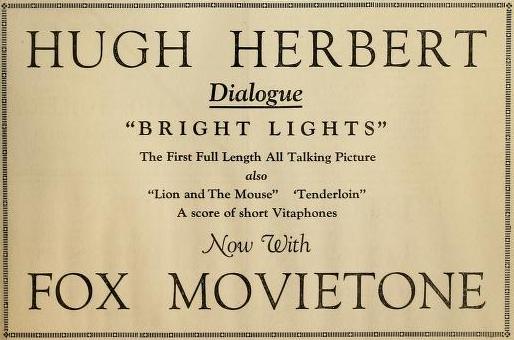


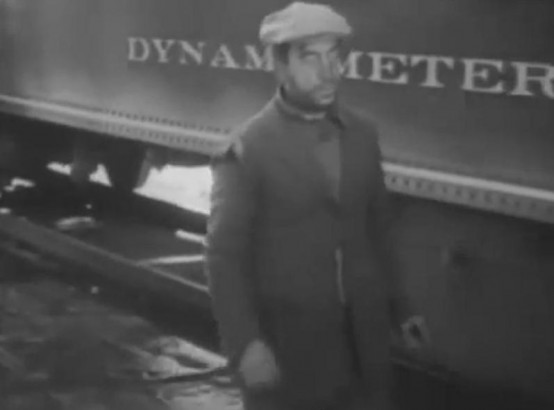
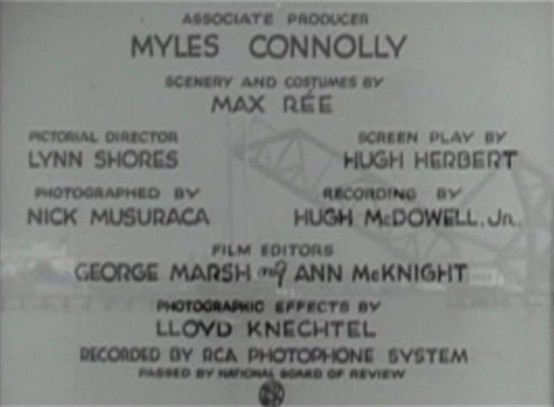
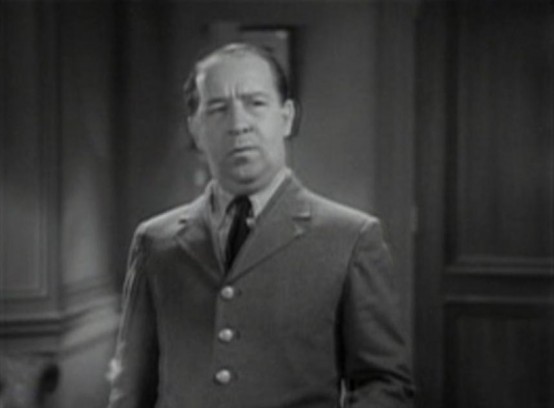





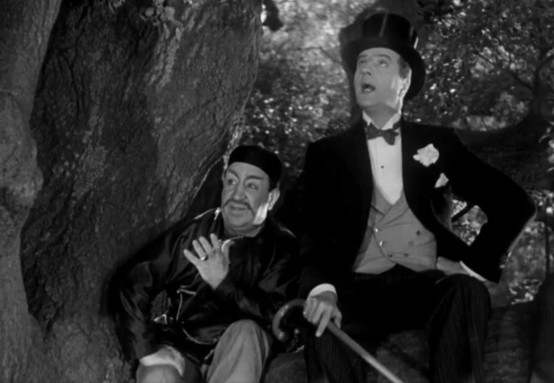

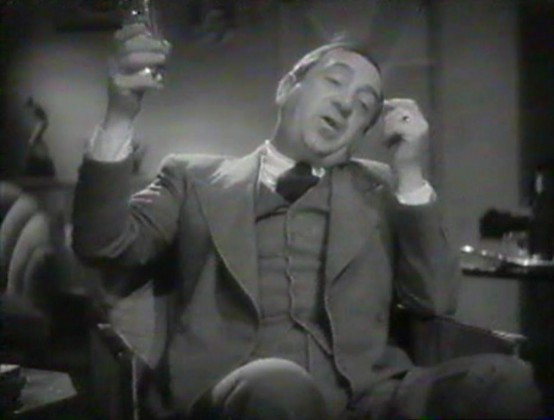


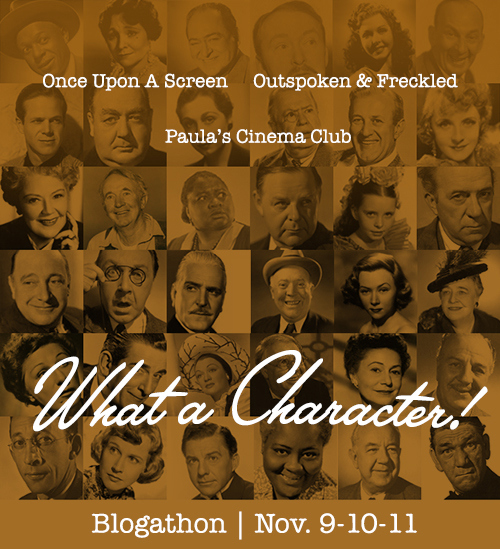
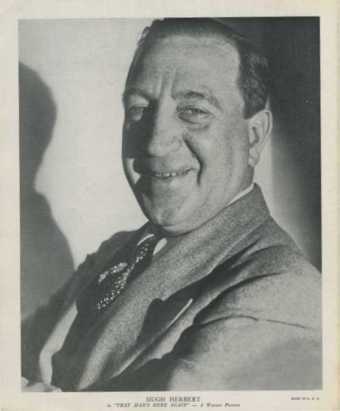


All confusion regarding Hugh and F. are dispelled forever. You have also given me a list of movies that I would like to catch someday. I’m constantly amazed that although it is the Hollywood careers that spark my interest in certain actors, it is their pre-Hollywood lives that seem the most interesting.
All I can say is thank goodness for Media History Digital Archive and especially their new Lantern search. It’s the only possible way to get a timetable on where each of these guys were week by week and help make sense of it all.
Oh, PS, I highly recommend Traveling Husbands (1931) of those I mentioned. Hugh is good in it and Stanley Fields is always fun, but I really enjoyed each of the leading ladies, Evelyn Brent and Constance Cummings. I may post something about it soon.
Thanks for reading!
This is fascinating. Thanks for clearing up the Hugh Hubert / F. Hugh Herbert confusion.
I was stunned to read that he was not Jewish! And also saddened to read of the Herberts’ divorce. It’s too bad he became melanchony and suffered such a personality change.
Great post! Thanks for including Hugh Herbert in the blogathon.
The late divorce seemed very polite, despite the public airings of what seem to be mostly minor complaints. A big deal was made of Rose not taking him for much more. I’d love to learn more about Rose Epstein’s later life, but for the purposes of this post I became overly fascinated with confirming she was Anita Pam to even attempt digging into her life after Hugh’s death (if even possible).
I’m really hoping it was just the ex-Mrs. Herbert who found Hugh sad late in life. It could be that the relationship just ran its course and they were unhappy around one another. Who knows.
Thanks for reading!
Wow – a fantastic post! And what a story – more interesting than any movie he ever made. He was always memorable and always a pleasure to watch.
Thanks, Marsha. It’s funny, but now that I’m done with this Hugh has popped up in the last two movies I’ve watched: Men Are Such Fools last night and Four’s a Crowd tonight (both 1938). He was especially funny in last night’s movie. Thanks for reading!
“A hot water bottle and a cucumber” – now THAT’S A FACE!! Wooo Hooo! to you, Cliff! You show extraordinary determination is setting the Hugh Herbert record straight and did so here in a compelling manner – a wonderful read! KUDOS!
Aurora
Aurora, thanks for noticing–yes, once I started digging in to Hugh vs. F. Hugh I was extremely determined to unravel which was responsible for what. “Our Hugh” becomes a much more fascinating talent once you realize he did a lot more than ‘Woo woo’ and ‘Woo hoo’ throughout the ’30s and ’40s! All of the extra shorts and RKO features also help make that Lights of New York credit look less flukey!
excellent read, so richly researched and detailed as usual. I’ve seen him SO many times but knew zero about him. A master of the double take. and thanks for the Lantern tip, I’ll be checking that out for sure.
Thanks, Kristina! I know Hugh can get on some people’s nerves and I’d never try to hook a new classic movie fan with anything he was in, but he’s grown on me over the years. I know you’ve written about She Had to Say Yes before and I think it was his less sympathetic turn there that really put me over the top on him and ratcheted up my own curiosity (I absolutely LOVE when Loretta calls him ‘sucker’).
Oh my goodness, that Lantern search is HUGE for research. I used to do my best to search individual issues at Media History Digital Archive, but I actually managed to glance through over 2,000 Hugh Herbert (Hugh and F. Hugh) related articles this past week putting this together. No, I didn’t open every resource, but I did look at plenty of them in detail and I really felt like I hadn’t missed out on anything once I was done and ready to write this.
I know, with some bigger things I’ve researched, the research was the best part. I love to look through those types of things and this will get me hooked all over again. Just this morning was already checking out Lantern search and perusing some of the Film Dailies with my coffee. Which reminds me I have a couple of the Film Daily yearbooks, the person I bought them from said he got them from Leonard Maltin. Who knows, but it’s fun to think so. 🙂
Kristina, I’ve got one of the Film Daily yearbooks (1932, I think), but a few years ago I thought my huge reference score was the 3-volume set of A.F.I. books for the ’30s. Within a few weeks of acquiring them though I figured out that TCM had A.F.I. notes included on all of their database titles, making my big books redundant and unwieldy!
Probably my most used reference book of this type is the New York Times book of reviews from the ’30s. While I can still access many of the old Times reviews online, their paywall does get in the way sometimes, so the physical book is nice back-up! In fact, I just had it out last night for info on a coming post.
For many folks, Hugh Herbert is a love-or-hate proposition. I personally love him. Herbert appeared in several shorts and features from my favorite movie sub-genre, the “horror-comedy.” I am currently writing a book on the sub-genre called SCARED SILLY: CLASSIC HOLLYWOOD HORROR-COMEDIES. I’m blogging my way through the book, and interested readers can read some of my Hugh Herbert movie reviews at http://scaredsillybypaulcastiglia.blogspot.com/search?q=Hugh+Herbert
Hey Paul, totally agree on the love-or-hate remark, very little middle ground. As you can probably tell in the piece I preferred his early stuff at RKO before he totally fell into the Hugh Herbert character. I do like his ’30s stuff at Warner Bros., but then I admit he begins to wear on me some. By the way, wonderful coverage of some rarities over at your place.
Thank you, Cliff. I’m a big fan of Hugh as supporting comic in the Wheeler & Woolsey (especially my second-favorite film from that pair, Diplomaniacs) and Olsen & Johnson movies. And I’m probably a bigger fan of The Black Cat than most folks I know. The four horror-comedy shorts Herbert did with the amazing Dudley Dickerson and of course Sh! The Octopus are also great standouts for me. Thanks for your kind words, and thanks for your great post on Hugh!
I really enjoyed the Wheeler & Woolsey movie which, agreeing with what everyone else seems to say, had the feel of a very politically incorrect Marx Brothers movie! Sh! The Octopus was a bit over the top for me, though I thought Hugh was (mostly) very funny in it!
Thanks again!
The best part about stumbling around the internet is winding up on a wonderful site like this one !
Thank you for not only keeping Hugh Herbert’s memory alive but also providing so much fascinating biographical information as well.
If I may please add a personal recommendation, his supporting role as Peter Blainey in “Faithless” (1932) opposite a stunningly beautiful Tallulah Bankhead is exceptional and the polar-opposite of his “Woo woo!” character.
As Peter Blainey, a wealthy but coarse “sugar daddy” who helps engineer the “fall” of heiress-gone-broke Bankhead (surely one of the only times Tallu needed any help), Herbert is essentially the film’s villain.
But while Blainey is more or less just another version of the sexually predatory bad guys who in earlier incarnations twiddled their moustahces while tying “Little Nell” to the train tracks, Herbert plays him without a hint of villainy. He is, rather, a PIG — a selfish, vulgar, manipulative, amoral user of young women whose mere physical touch is as repulsive to viewers as it is to Bankhead.
For Tallulah fans like myself, “Faithless” is, of course, required viewing. But Herbert’s performance is so vividly memorable that it ALMOST succeeds in making his entire “Woo woo!” repertoire unbelievable, so low and vulgar is he !
Thanks for your wonderful site and for letting me add my 2 cents worth.
Thanks for stumbling my way!
Completely forgot about Faithless, thanks for the reminder! In fact, you made an impact on my viewing tonight–as I smacked my forehead at this oversight I figured why not watch it again so I could reply to you more intelligently.
And boy, you said it! He’s so good that once or twice I began feeling a little bad for Mr. Blainey, but then he’d just as quick push me away. As an aside I love how gentlemanly Robert Montgomery behaved when H.H. informed him that he was the one paying for the apartment they stood in. I half expected Montgomery to knock Hugh down, but instead he offered a polite apology and went on his way, leaving Blainey and Carol (Bankhead) to smash furniture and brawl.
Not sure if you’ve seen She Had to Say Yes, which I did make mention of, but Herbert’s piggish Blainey reminded me most of that character. Neither a “bad” man per se, but each a complete chauvinist of the period, unable to see women as anything but their playthings. There’s your wife and then there are all of the other girls. Two characters cut from the same cloth.
Glad I got back to this one. It’s built so much around the two stars that Hugh’s performance had really escaped my memory. Hopefully I can make the time to cover Faithless in more intimate detail at a later date.
Thanks again, Cliff